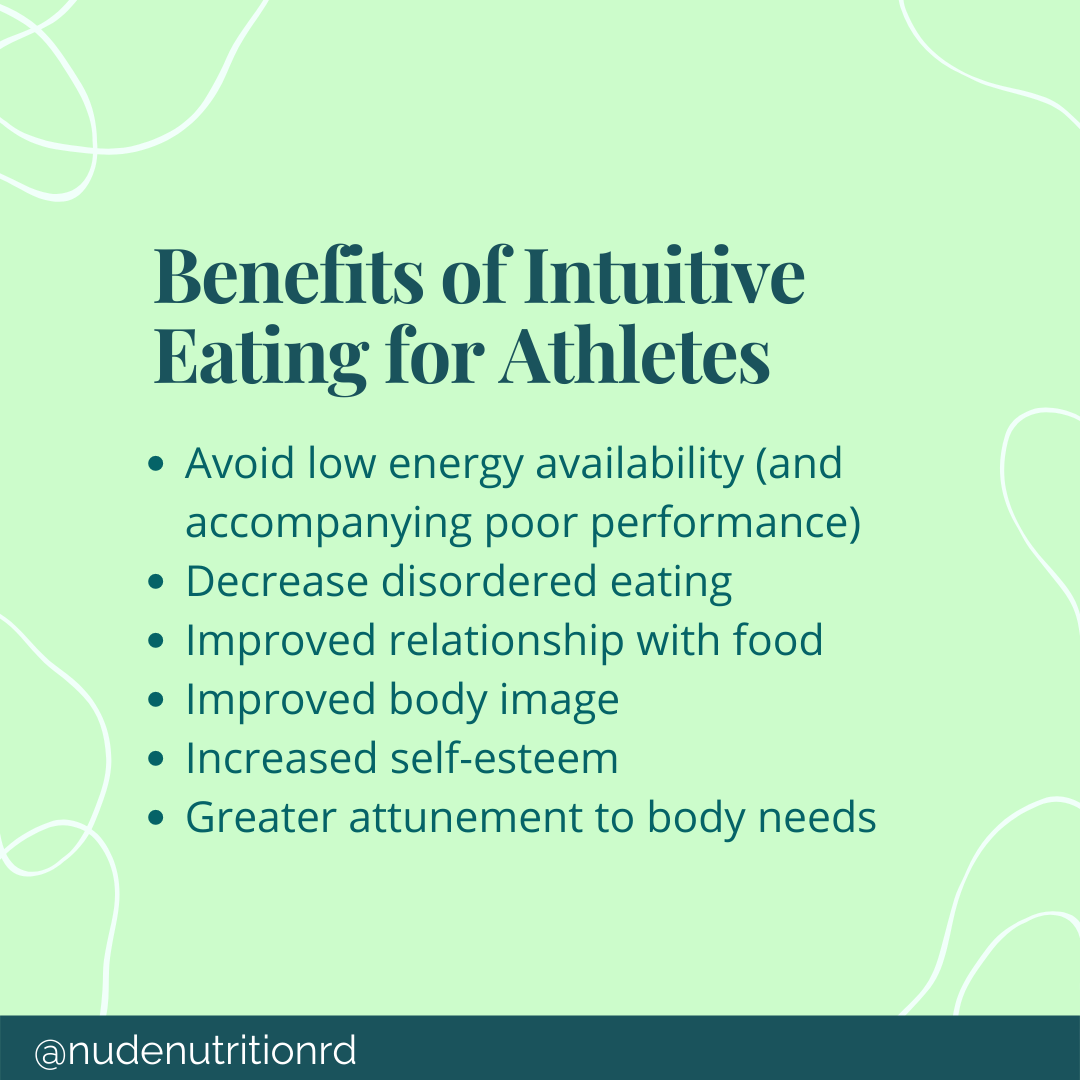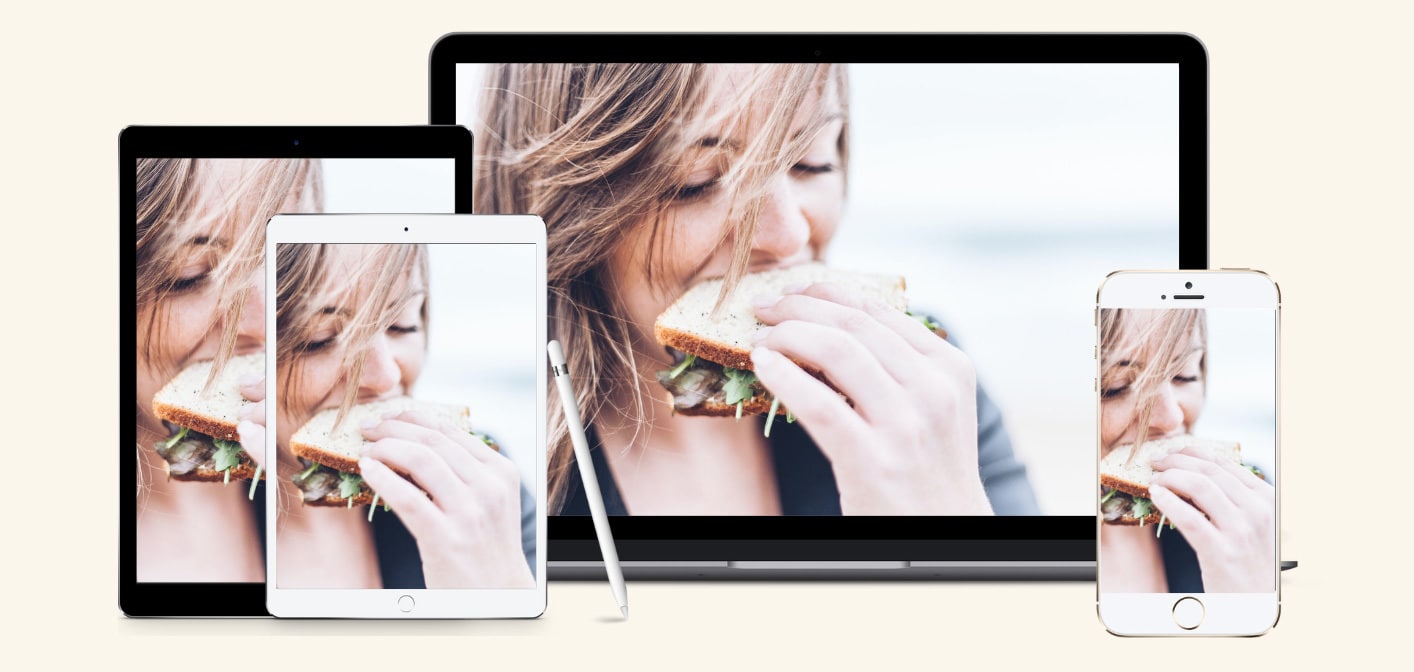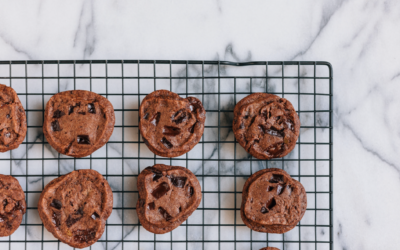What are the benefits of Intuitive Eating for Athletes?
The benefits of intuitive eating in sport include:
Athletes have high activity levels and high energy expenditures. They also often have little free time on their hands. There are many considerations for an athlete’s diet. These include meal composition, meal timing, and getting enough calories and enough macronutrients.
But, it is certainly possible to do all this AND still be in tune with what your body wants and needs at any given time.
Low energy availability is a common issue in athletes. This is when an athlete is not eating enough to support what they are expending on a daily basis. Lack of dietary energy can lead you to feel pretty miserable. If you are female, you might even be missing your period. This is a big red flag from your body. Trying to get through a one or two-hour practice, training session, or game with a lack of fuel is not going to feel good. It will also negatively impact performance. But low energy availability can be prevented. Intuitive eating may be able to help with this.
Intuitive eating can also allow athletes to free up brain space. Worrying about calories burned during a workout or counting food throughout the day gets exhausting. Intuitive eating frees up some of this brain space. You can then use it on other things in life that are meaningful to you such as relationships, career or school.
7 ways you can use Intuitive Eating as an Athlete
Eating intuitively as an athlete involves rejecting rigid food rules. And working out the way of eating that works best for your individual body.
Here’s 7 ways you can begin to do this:
1. Each workout is different. Trust your body. Macronutrient needs differ with each workout. This depends on intensity, duration, injuries, temperature, sleep and so many other factors. A regimented diet plan struggles to account for account for all of this. Listening to your hunger signals and cravings, alongside nutrition knowledge can help you identify how much to eat around workouts.
2. Fuel for performance over appearance. As an athlete, you might be abusing food and exercise as a way to manipulate your body to fit a certain standard. Intuitive eating encompasses the principle of Body Respect. It emphasises a positive relationship with food over weight or appearance. To re-gain a healthy relationship with food you may need to gain weight, lose weight, or even stay the same. This can feel scary initially but can be worked through with the correct support. Under-fuelling to fit body ideals harms us physically and mentally. By learning to respect your body, you will feel (and perform) better than ever.
If you are in a situation where you are required to meet certain weight targets to compete or participate in your sport, then it could be worth reaching our to an eating disorder- informed sports dietitian to help navigate this.
3. Know that all foods fit. An occasional scoop of ice cream or slice of pizza won’t affect your performance goals. Intuitive eating allows you to feel at peace with all foods, whilst honouring your health.
4. Utilise the off-season. Some sports can put pressure on athletes to manipulate physique during the off-season. It is possible to implement intuitive eating all year long. But you can take advantage of this down-time to begin to check in with hunger and satiety cues, and explore food rules.
5. View eating as self-care. View food as nourishment, not punishment. Focus on a way of eating that feels good to you; in body, mind and spirit.
6. Honour your tastebuds. As an athlete you have specific nutritional needs. You can eat intuitively around those needs so ensure eating is still enjoyable! For instance, you likely need to consume protein with each meal. It’s ok to honour your tastebuds and choose the specific type of protein that you enjoy when it comes time to eat. You don’t need to follow a strict diet regimen and can instead eat what makes you feel your best.
7. Free up some brain-space. Spending all day obsessively thinking about macronutrients and calories is exhausting. Applying intuitive eating principles can help you focus on non-sports-related things and free your mind of obsessive food thoughts. This will contribute to a well-rounded lifestyle that positively affects performance and mindset.
That’s a wrap!
In summary, Intuitive Eating is certainly appropriate for Athletes. Intuitive eating can provide many benefits for athletes. These may include improved performance and a healthier relationship with food and body. If you are interested in individual support from an experienced Dietitian and Certified Intuitive Eating Counsellor, you can learn more about what that looks like here.
Want to read more about intuitive eating? Check out these articles:







